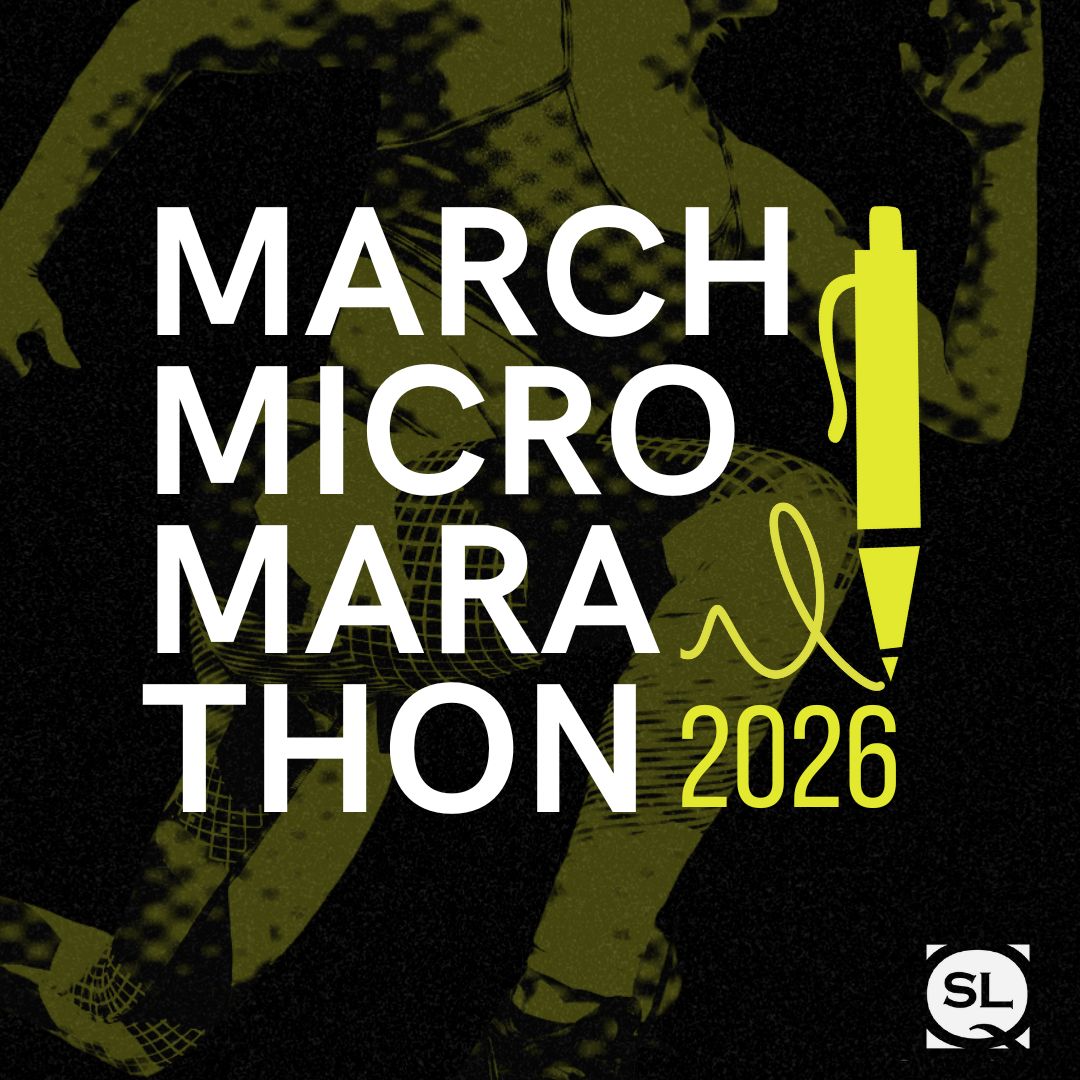
In SmokeLong‘s “Why Flash Fiction?” series, flash fiction writers and editors explore what draws them to the form, from the first time they wrote a piece of flash to why flash resonates with them. In this column, SmokeLong Managing Editor Christopher Allen takes down comparisons between flash and novels, and explains why flash is like a really short hottie at a party. Submit your own “Why Flash Fiction?” article or other flash-related essays on our Submittable page!
By Christopher Allen
At AWP this year I must have spoken to 500 writers about SmokeLong and flash fiction. Many of these writers said they were trying their hand at it. The form is hard to overlook these days. Most journals offer the category, and SmokeLong even offers a flash fiction fellowship. Flash is popular—like that really hot, really short guy at a party who everyone wants to talk to.
But there was this one person—there’s always one—who reacted with such vehemence that I can’t possibly withhold her from you. When I asked her if she read very short fiction, she replied, “Oh no no no. Short fiction is anethema [sic]! There’s no room for character development!” (Before I go any further, I should point out that our conversation began with her asking me if I knew where she could find wine.)
How important is character development in flash fiction? In the narrative arts in general? Where does development end and beating a dead horse begin? And why compare flash fiction to novel-length prose at all? In my mind these two forms require very different skill sets. It’s like comparing apples and Rollerblades. You might as well tell an Olympic diver his perfect-10 front 4 ½ is irrelevant: not a novel. Sorry, writer of your masterpiece villanelle: not a novel. Three-star Michelin chef, your amazing soufflé was tasty but didn’t have quite as much character development as, say, a novel. Hey, Fabergé! Eggs? Really? Couldn’t you write novels? (I’m stretching the illustration, but I’m also having fun.) Paul and John, “Yesterday”—no matter how much money you and your children make each year—is too short for character development; in fact all of your songs are. Tennessee, Suddenly, Last Summer is too sudden, so last summer. Where are the other two acts? Where is the novel? And don’t get me started on Shakespeare’s sonnets. Why did he even bother? Fourteen lines? Not one of them a novel.
I hope you see my point: character development is only one aspect of art. Flash fiction is not, and was never meant to be, the malnourished, stunted little brother of the novel; it’s a narrative form unto itself with its own ambitions. As an editor of flash over the last eight years I’ve read around 2000 of these very short stories each year, so I feel I know a good piece of flash fiction when I see it (which doesn’t necessarily mean I always write good flash; we all know we can churn out some clunkers). Good flash prose moves quickly, sometimes with explosive energy but sometimes in subtle waves; it dares to use innovative language that accomplishes in a paragraph what longer prose often doesn’t manage in a chapter; it’s focused and tight, self-confident and rare. It’s so short that the writer can’t afford infelicity or longueurs. In this way, flash is much more like that front 4 ½ dive or that villanelle than a seven-hundred-page all-you-can-eat buffet of a novel. I loved Lord of the Rings, but there was definitely a tad too much walking through the woods. Walking through the snow. Walking through bogs. Walking through caves. For what seems like hundreds of pages. Length doesn’t equate to “development.” Take, for example, the composition Organ²/ASLSP (As SLow aS Possible) by John Cage. The performance began in 2001 and should last 639 years. The last note change happened in 2013; the next won’t come along until 2020. Talk about a longueur.
My own meandering, slow path to flash fiction started in graduate school when a professor, after reading one of my essays, told me I should be writing short stories. As is my habit with all great advice, I ignored hers at the time. I continued working on my novel. I wrote three of them (all unpublished and probably unpublishable). I also wrote two screenplays and published two very bad poems. It wasn’t until I joined an online writers’ group that I started to dabble in the form and began to see what my professor had meant. Something about that small space of writing drew my thoughts together in a pleasing arc. That something was “the moment,” and I think this is the ambition of flash I mentioned earlier: to concentrate art into a moment. While at graduate school I read just about everything Virginia Woolf wrote, first because it was required and then because I loved the words on the page. I was inspired and moved by the rhythm of her prose (as I continue to be in so many subtle ways).
Years later I’ve come to realize how Woolf’s idea of moments of being and non-being has influenced my love for flash fiction. Woolf describes this so well in “A Sketch of the Past” that I find it difficult to find a tiny portion of it to quote here. Moments of being are deeply profound events that are branded in one’s memory while moments of non-being are going-through-the-motions events, which are easily forgotten. I find it interesting that Woolf says, “The real novelist can somehow convey both sorts of being. I think Jane Austen can; and Trollope; perhaps Thackeray and Dickens and Tolstoy. I have never been able to do both.” Very funny. A sort of backhanded compliment? I think what Woolf is really saying here is that she was never interested in moments of non-being. She was really only interested in the exhilarating world of a profound moment.
If we look back at that front 4 ½ dive, it has a beginning (set up), middle (somersaulting, twisting through the air), and an end (entry into the water). The art of the dive demands technical precision, elegance and timing—as do all of the narrative arts on some level, but flash has the gravity of a very limited word-count pulling it toward the water. It is an exhilarating moment. That’s my point. And that’s the flash I love.
I write longer stories, and I appreciate their space to take a character on a longer, more relaxed journey. That said, I also think focusing on flash fiction has improved my longer prose. It has taught me to create art at the sentence and word levels, to concentrate on urging the reader along on a ride rhythmic and surprising. In the end, though, you write and read what moves you. And in the end—God—aren’t we just happy that people are reading?
And in the very end, I was content to leave the person at AWP to believe what she wanted about flash fiction and the primacy of character development. You can’t save everyone. I did help her find her wine, but I didn’t tell her we had bourbon at the SmokeLong table. As the adage goes: “wine is fine, but liquor is quicker.” Sometimes I drink wine; sometimes I drink bourbon. Sometimes 12% alcohol, sometimes 44%. And there’s room for both.
Christopher Allen’s flash fiction has appeared or is forthcoming in The Journal of Compressed Creative Arts, Indiana Review, Camroc Press Review, Literary Orphans and lots of other beautiful places. His story “A Clown’s Lips” was the recipient of Ginosko Literary Journal’s award for flash fiction. SmokeLong Quarterly nominated his story “When Chase Prays Chocolate” for the Pushcart and included it in SmokeLong Quarterly: the Best of the First Ten Years (2003-2013). And he’s received a few other nods. Since 2014, Allen has been the managing editor at SmokeLong Quarterly. He lives somewhere in Europe. Find him online at @christopher_all or www.imustbeoff.com.


 In its third year, The March Micro Marathon will be, as usual, a prompt-a-day whirlwind for 24 days. You’ll exchange drafts of micro fiction, non-fiction, and prose poetry in small groups and gather for a series of online events (all recorded for participants unable to attend live). We’ll finish with 3 competitions, and participants who are not already in SmokeLong Fitness will be invited to workshop with SmokeLong Fitness until the end of April!
In its third year, The March Micro Marathon will be, as usual, a prompt-a-day whirlwind for 24 days. You’ll exchange drafts of micro fiction, non-fiction, and prose poetry in small groups and gather for a series of online events (all recorded for participants unable to attend live). We’ll finish with 3 competitions, and participants who are not already in SmokeLong Fitness will be invited to workshop with SmokeLong Fitness until the end of April!